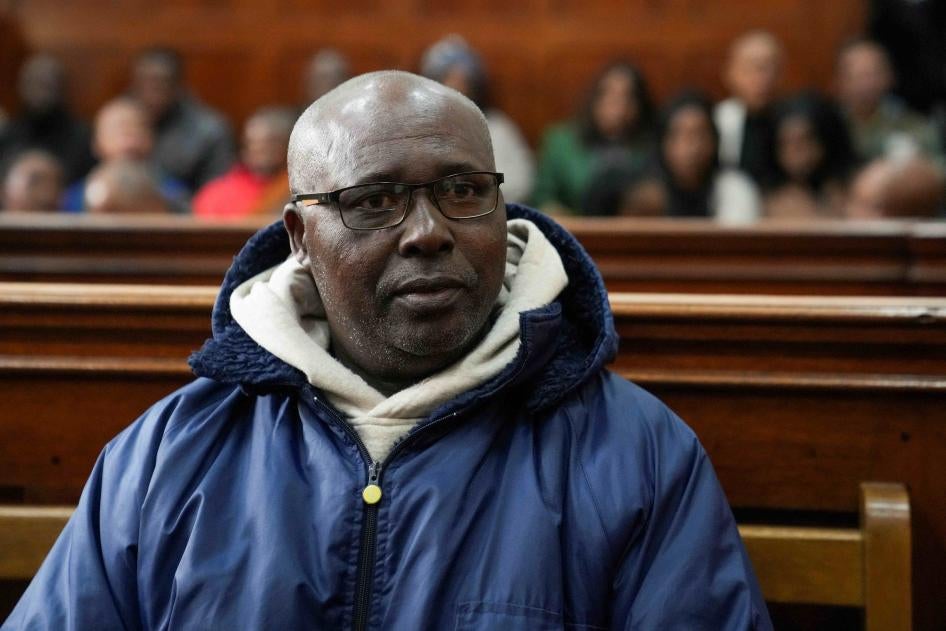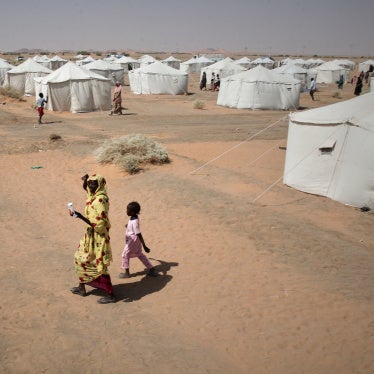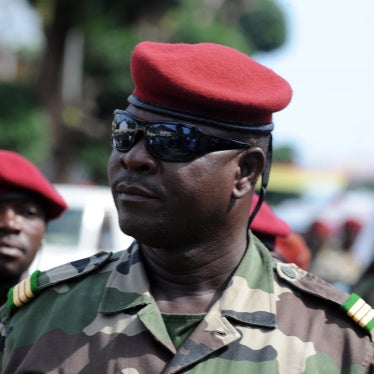(Nairobi) – The arrest of Fulgence Kayishema is an important milestone in the search for justice for crimes committed during the 1994 Rwandan genocide, Human Rights Watch said today. His due process and fair trial rights should be guaranteed so that justice can be delivered.
Kayishema had been evading justice since 2001, until his arrest on May 24, 2023, in South Africa. He is alleged to have planned the killings of more than 2,000 men, women, and children on April 15, 1994, at a church in western Rwanda. Orchestrated by ethnic Hutu political and military extremists, the genocide claimed more than half a million lives and destroyed approximately three quarters of Rwanda’s Tutsi population in just three months.
“Kayishema’s arrest shows there is no expiration date on justice for the most serious crimes, and would-be perpetrators globally should take note,” said Lewis Mudge, Central Africa director at Human Rights Watch. “His arrest and expected trial can offer some respite for the loved ones of victims of the terrible crimes committed 29 years ago in Rwanda, in particular in Kibuye Prefecture.”
Kayishema was first indicted by the International Criminal Tribunal for Rwanda (ICTR) in 2001. The indictment alleges that he directly participated in planning and executing the church massacre, including by trying to burn the structure while over 2,000 Tutsi hid inside. Failing to ignite the church, the indictment says, he helped plan to use a bulldozer to collapse it, burying, and killing those who had sought refuge there. The indictment says that Kayishema and others then supervised moving the corpses from the church grounds into mass graves.
His case was transferred to Rwandan authorities in 2012 following the first referral by the tribunal of Jean Bosco Uwinkindi, in 2011. Human Rights Watch filed an amicus brief in 2008, opposing the transfer of the Kayishema case to Rwanda, on the grounds that Rwanda could not guarantee a fair trial.
Kayishema had evaded arrest and never been brought to trial by the tribunal, which closed in 2015. It was succeeded by the International Residual Mechanism for Criminal Tribunals (IRMCT).
Kayishema’s arrest comes as several other people alleged to be high-level planners of the genocide in Rwanda have either been arrested or confirmed dead. Félicien Kabuga, an alleged mastermind behind the genocide, was arrested in France in May 2020. Kabuga’s trial started in September 2022 before the IRMCT, but was suspended in March while judges considered whether he was mentally fit to stand trial.
Just days after Kabuga’s arrest, the IRMCT announced that the remains of Augustin Bizimana – the defence minister at the time of the killings – were identified in a grave in the Republic of Congo. Additionally, in May 2022, Protais Mpiranya – the commander of the army’s presidential guard at the time of the genocide – was confirmed dead. The late Human Rights Watch senior adviser Alison Des Forges had documented that Mpiranya was implicated in leading militia members and ordinary civilians in carrying out the killings. In May 2022, the IRMCT prosecutor also confirmed the death of another fugitive, Phénéas Munyarugarama, in the eastern Democratic Republic of Congo in 2002.
As a result of these deaths, survivors have been robbed of their chance to see those allegedly responsible for the genocide face the accusations against them in a court of law, Human Rights Watch said.
Kayishema is now facing proceedings in the South African court system. Rwanda’s Public Prosecution Authority was quoted in media reports as saying that Kayishema is expected to be transferred first to the IRMCT in Arusha, Tanzania, and then to Rwanda for trial.
When it is possible to guarantee fair trials, it is best to prosecute international crimes such as genocide and crimes against humanity where they were committed, close to the victims and the affected population. However, in Rwanda, the justice system lacks full independence, and the government can exert pressure to influence the outcome of trials, especially in politically sensitive cases. This risks undermining the rights of the accused in the case, as well as those of the victims to receive meaningful justice for the atrocities they have endured.
When the tribunal closed, the IRMCT was tasked with arresting and prosecuting the nine remaining fugitives it had indicted. It retained jurisdiction over Bizimana, Kabuga, and Mpiranya, while the six remaining cases were referred to Rwandan authorities, including those of Kayishema and Munyarugarama. Three others – Charles Sikubwabo, Aloys Ndimbati, Charles Ryandikayo – remain fugitives.
Ladislas Ntaganzwa, whose case was also transferred to Rwandan authorities, was arrested in Congo and transferred to Rwanda in March 2016, where he faced trial. He was convicted of genocide and other related crimes in May 2020 and his conviction and life sentence were maintained on appeal in March 2023. The long duration of the trial also raised fair trial concerns.
In its November 2018 monitoring report, the IRMCT reported that Ntaganzwa had told the court he was held in solitary confinement for 25 days, and that prison authorities had harassed him, threatened to beat him up, and intimidated him for breaching prison regulations after he was found to have a mobile phone. In a meeting with Ntaganzwa in December, he told the IRMCT’s monitors that his defense lawyers had not been allowed to see him during his solitary confinement, that the authorities had confiscated his laptop for a day, and that he was concerned they had gone through his defense documents.
In March 2019, one of Ntaganzwa’s defense lawyers expressed concern that sharing the defense’s witness list early on in the proceedings would lead to it being tampered with. Ntaganzwa repeated his concerns regarding the prison authorities’ attempts to monitor his communications and laptop on several occasions.
The IRMCT monitors trials referred to national jurisdictions and has the authority to revoke a referral if it determines that a trial is unfair as set out in article 6 of its statute and rule 14 of its rules of procedure and evidence.
In July 2021, the Association of Defence Counsel practising before the International Courts and Tribunals (ADC-ICT) expressed concern that a defense lawyer practicing before the IRMCT may have been a target of Rwanda’s use of the Pegasus spying software. According to the Pegasus Project, an international investigative journalism initiative, the phone number of a defense lawyer representing Marie Rose Fatuma in the Nzabonimpa et al proceedings before the IRMCT was on a list of numbers to be potentially targeted with the malicious software manufactured by Israeli tech firm NSO Group.
The lawyer in question has also represented high-profile government critics such as Paul Rusesabagina. Rusesabagina’s September 2021 conviction highlighted some of the fundamental, persisting issues relating to the manipulation and politicization of the judiciary in Rwanda.
Rusesabagina’s arrest and detention started as an enforced disappearance in August 2020. Nevertheless, in 2021, the High Court ruled that Rusesabagina’s transfer was legal. In February 2021, then-Justice Minister Johnston Busingye inadvertently admitted the government’s role in Rusesabagina’s enforced disappearance, illegal transfer, and fair trial rights violations – including the interception of privileged communications between Rusesabagina and his lawyers – in a recorded call. Rusesabagina’s 25-year conviction was commuted in March by a presidential order.
While the Rwandan government established a special law to regulate cases transferred from the ICTR or other countries, these cases still fall within the jurisdiction of the High Court. The manner in which the High Court and other courts continue to manage prosecutions is indicative of the risks that may exist to the due process and fair trial rights of an accused in a transferred genocide trial.
For example, on September 30, 2021, Yvonne Idamange, a Tutsi genocide survivor who accused the government of monetizing the genocide and called for a protest, was found guilty of inciting violence and public uprising, denigrating genocide memorials, minimizing the genocide, and spreading rumors and violent assault, among other charges. Her trial was held behind closed doors at the High Court’s Special Chamber for International Crimes and Cross-border Crimes, after the prosecution argued she posed a risk to public order, and she was handed a 15-year sentence, which was increased on appeal to 17 years.
“Kayishema is alleged to have committed genocide and crimes against humanity, and a free and fair trial is necessary for a full reckoning,” Mudge said. “The IRMCT has a responsibility to ensure that Kayishema receives a fair trial so that the fundamental rights he allegedly violated are upheld.”









